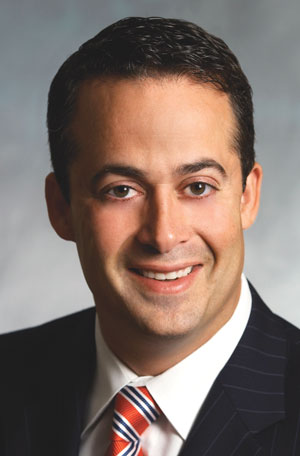While the buzz around a reality show can be exciting, being involved in the legal aspects of one that can represent the start of new ventures for Canadian business people and entrepreneurs is a particularly rewarding experience, says one Toronto lawyer.

“Being involved in a successful reality TV show that’s in its second season is fun and exciting for me; people have heard of it,” says Andrew Wilder, a partner at Aird & Berlis LLP in Toronto and lead counsel to Dragons’ Den on CBC.
Dragons’ Den, in its second season, each week features a group of aspiring entrepreneurs who pitch their business concepts and products to a panel of Canadian business moguls, known as the Dragons, hoping to convince them that the idea is worth their financial support. The Dragons ask the contestant numerous questions about their concept and, if they see it as viable, they make an offer to invest in the idea, which the contestant must also agree to.
Current Dragons are Arlene Dickinson, owner of marketing communications company Venture Communications; Robert Herjavec, head of The Herjavec Group, one of Canada’s leading and fastest-growing IT security and infrastructure integration firms; Laurence Lewin, who co-founded the La Senza lingerie chain; Kevin O’Leary, “eco-preneur”, director and shareholder of EnGlobe, Canada’s leading integrated environmental services company; and Jim Treliving, the man behind Boston Pizza.
Wilder became counsel to the show in its first season, last year, when he assisted one of the Dragons in contract negotiations with the network. He was then asked to represent that Dragon in any deals he may be involved in and eventually ended up representing all of the show’s Dragons. This year, Aird & Berlis was hired as exclusive legal providers to all of them.
As a corporate finance lawyer, Wilder says the core of what he typically does - which includes trying to raise money for companies and acting for investors who invest in companies - makes this a perfect fit for him.
The main difference, he says, is that as a Bay St. law firm, it is typically involved in deals in the many millions as opposed to hundreds of thousands, which all of the deals on the show are worth.
Apart from the thrill and excitement of the show itself, one of the most rewarding aspects of working on something like this, says Wilder, is seeing the entrepreneurs succeed.
“Whenever there’s an opportunity to assist a hopeful entrepreneur realize their dreams, it’s an incredibly rewarding experience for me, personally,” he says, adding this is one of the factors that made working with the show appealing and rewarding.
“When you close a deal with these entrepreneurs, there’s such tremendous energy and excitement on the part of the entrepreneurs and the Dragons, as it represents the beginning of a new business venture for all of the parties,” he says.
Wilder’s role on the show begins before there are any contestants, as he works with the Dragons to help them negotiate their contractual relationships with the CBC. He then works on the releases contestants sign before they go on the show.
During taping, when a contestant and the Dragons make a deal, it is subject to both legal and business due diligence, which is where Wilder comes in again.
While the Dragons complete their business due diligence on the company, Wilder makes sure there are no legal conflicts, and prepares due diligence reports based on information provided by the contestants, highlighting areas of potential risk or concern to the Dragons - in particular, to verify the statements made during the contestant’s pitch.
He then creates a term sheet, outlining the road map to close the transaction, followed by the required documents, which are sent to contestants lawyers, followed by the closing. The entire process can take from six to 10 weeks, says Wilder.
As some of the ideas are in the early stages, Wilder says that about half of the contestants have counsel, usually those who are already operating businesses. When they don’t have counsel, Wilder says he and those involved with helping the entrepreneurs usually recommend that they find representation they think would be helpful.
Working on the show has also given the firm good profile, says Wilder, as students interviewing for summer and articling jobs at Aird & Berlis are aware and ask questions about their involvement on the show.
Students and young lawyers at the firm are also excited to work on the project, he says, as it involves out-of-the-ordinary things for a typical lawyer, including the potential to be on TV when deals close.
In addition to getting the chance to attend tapings of Dragons’ Den, Wilder has also had the chance to work with many people he wouldn’t have otherwise, including the five Dragons; the CBC, including its legal department, executive producer, and marketing department; others involved in helping the entrepreneurs with their pitches; and the entrepreneurs themselves.
“The difference between business law and litigation law is you don’t really have a winner and a loser. Ideally, you have winners. The Dragons are winners because they invested in this great, great opportunity at a low price, the company is a winner because they got the investment that they desperately need to realize their dreams.”
As a result of the “win-win” situation, Wilder says he often talks to the contestants about issues that a lawyer wouldn’t normally address in a litigation-type adversarial relationship.

 “Being involved in a successful reality TV show that’s in its second season is fun and exciting for me; people have heard of it,” says Andrew Wilder, a partner at Aird & Berlis LLP in Toronto and lead counsel to Dragons’ Den on CBC.
“Being involved in a successful reality TV show that’s in its second season is fun and exciting for me; people have heard of it,” says Andrew Wilder, a partner at Aird & Berlis LLP in Toronto and lead counsel to Dragons’ Den on CBC.